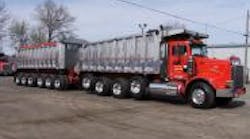“How far would Moses have gone if he had taken a poll in Egypt?” –Harry S. Truman, 33rd president of the United States
I bring the great President Harry Truman into this post over polling results about heavier trucks for a reason – simply put, you cannot fully trust polls. Like President Truman said, polls can often muddy the waters significantly and even throw you off the correct path in life if you put too much faith in them.
The recent poll conducted by the Coalition for Transportation Productivity (CTP) offers a prime example. Obviously, for a coalition of more than 100 shippers and allied associations dedicated to increasing the federal weight limit for commercial trucks on interstate highways, poll numbers that show heavy favoritism of their position on this issue are going to get hawked about quite a bit.
It’s also true that, upon reading how the questions within this poll were structured, the poll itself might have skewed a good portion of people’s responses. It doesn’t take a rocket scientist to figure out that Americans would favor increasing the weight limit by a margin of 51% to 39% IF … and there is that all-important “if,” which is the middle word in “life” … IF higher weight limits contribute to safer roads, greater fuel economy and more productive highway transportation. I mean … DUH!!! … who WOULDN’T be in favor of heavier trucks if those are the payoffs?
All that being said, though, it is important get a glimpse of the American’s public thinking on this issue of heavier trucks. Obviously, they clearly favor it if [there’s that word again, always making things more complex!] there big benefits to be gained. It’s the standard, and appropriate, American response: if change is going to bring us more benefits with lower costs, let’s go for it.
Here are some of the other factoids released by the CTP from its poll:
• Americans are more likely to support increasing weight limits when they learn that additional axles would make the tractor-trailers safer and better for road surfaces.
• A strong majority (66%) would be more likely to support legislative action to allow trucks to carry more weight on interstates if those trucks add an extra axle.
• Americans are also more likely to support a weight limit increase due to positive environmental implications.
• Some 63% of those surveyed would be more likely to support an increase in weight that trucks can carry on interstates if it would reduce carbon emissions and fuel consumption.
The survey itself canvassed 1,000 American adults by leading pollster Wilson Research Strategies (WRS) June 16–22 this year via live operator telephone calls and has a margin of error of plus-or-minus 3.1%. WRS noted its poll sample was stratified to be demographically and geographically representative of the national adult population.
None of these responses should come as a big surprise to anyone. And these results are going to become part of the debate by CTP and other heavier truck advocates as they try to get the Safe and Efficient Transportation Act of 2009 (H.R. 1799), sponsored by Reps. Michael Michaud (D-ME) and Jean Schmidt (R-OH), passed in House of Representatives.
Again, this particular bill would allow for heavier – but not larger – trucks on interstates by giving each state the option to increase its interstate vehicle weight limit to 97,000 pounds for trucks equipped with a sixth axle for safety, stresses CTP Co-Chair John Runyan, (at right) who is also the senior manager of federal government relations for International Paper.
Without changing truck size, the additional axle maintains current braking capacity and weight-per-tire-distribution and minimizes pavement wear, he says, while a user fee imposed by the bill would help fund vital bridge repair should there be any damage incurred from the increase weight limits.
“Americans solidly back the same truck weight reform proposed by H.R. 1799 – providing strong support for Congress to responsibly raise the federal vehicle weight limit,” Runyan notes in a press release. “With truck traffic already increasing 11 times faster than road capacity and freight expected to double by 2025, H.R. 1799 would make sure America’s shipping needs are met in a way that improves highway safety and reduces our carbon footprint.”
Yet those firmly opposed to raising weight limits won’t be furling their sails anytime soon. They continue to back House bill H.R. 1618, entitled the Safe Highways and Infrastructure Preservation Act or simply the “SHIPA” bill – introduced March 19 by Rep. James McGovern (D-MA) with Rep. Mark Kirk (R-IL) as the lead minority cosponsor.
SHIPA seeks to freeze current truck size and weight limits for all states to those rules on the books as of June 1, 2008 – limiting truck trailer size to 53-ft long and weight limits to 80,000 lbs., unless a state allowed longer and heavier trucks to operate on its roads as of that date. Also under the McGovern bill, any group of two or more consecutive axles would stay consistent with the weights enacted under the Federal Aid Highway Amendments of 1974.
[And I wouldn’t be at all surprised to see a poll come out in favor of THEIR position, either, in the near future.]
One thing is for certain – the debate over increasing weight limits for heavier trucks isn’t going away anytime soon. So stay tuned for more developments when Congress comes back from its summer break.






